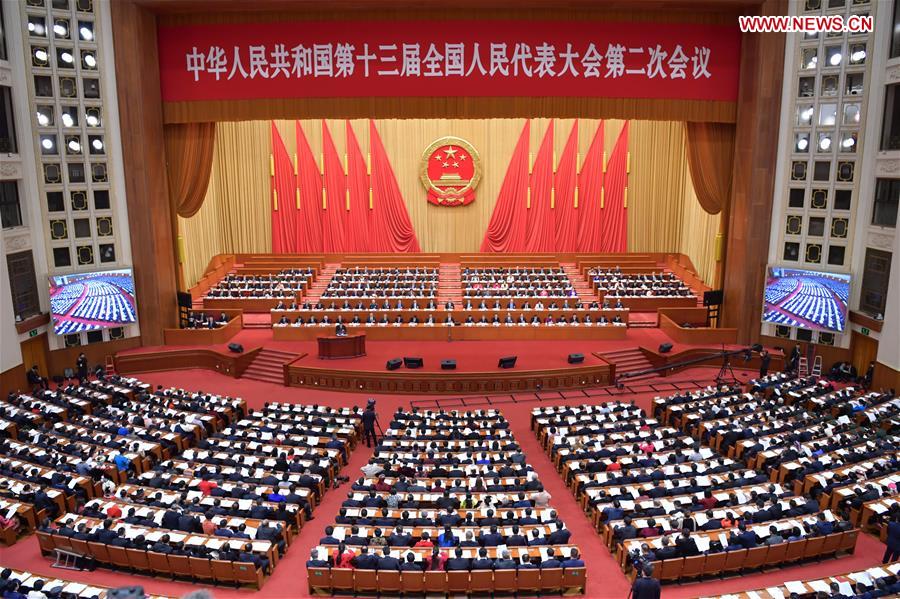Reform of SOEs Must Accelerate

China’s 2019 government work report mentioned “accelerating the reform of state-invested enterprises and state-owned enterprises (SOEs).” The reform of China’s SOEs began in 1978, but now it has entered a new phase, and the country’s economic situation has changed substantially.
From the perspective of the domestic economy, China has developed into a middle-income country with a per capita GDP of more than US$9,000 after decades of fast growth, but it now faces a two-sided “bottleneck.” On the one hand, China needs to depart from traditional modes of development when it has become a middle-income country. If it fails to achieve the prerequisite transformation and upgrading to move to the next phase of development, it is likely to fall into the “middle-income trap.” On the other hand, the principal contradiction facing Chinese society, which was previously described one between “the ever-growing material and cultural needs of the people and backward social production,” has now changed. The challenge now is to achieve balanced, high-level, equitable and coordinated development.
From the global perspective, the global politics and economy are undergoing a tremendous change that has not been seen in a century. The first challenge is multi-polarization. China has become the world’s second-largest economy with a GDP of US$13.6 trillion. This era has witnessed the rise of China as the world’s first major power not from the West. This has triggered competition among major countries and drastic readjustment of the international order. The second is the challenge of globalization. The world has continued to globalize since the 2008 international financial crisis, but in a different direction, with a different focus and engine. The willingness and ability of some Western countries to assume the responsibilities as great powers are shrinking, and there is a new rising trend of protectionism. The third is the challenge of a new round of scientific and technological revolution. The development of information technologies such as artificial intelligence, big data, cloud computing, as well as new energy, new materials, and biological sciences, have been increasingly accelerated. The Fourth Industrial Revolution is already in its infancy. New products, new formats and new business models have emerged, and the global economic landscape is shifting.

Xiao Yaqing (C), head of the State-owned Assets Supervision and Administration Commission of the State Council, deputy head of the commission Weng Jieming (R), and secretary-general and spokesperson of the commission Peng Huagang attend a press conference on the reform and development of state-owned enterprises for the second session of the 13th National People's Congress (NPC) in Beijing, capital of China, March 9, 2019. by Guo Shasha
The new era has set new requirements for the reform of SOEs. Throughout the reform of SOEs, breakthroughs have been made during every step: Within the first 15 years, the focus was on operational mechanism, such as reforming the contract responsibility system and profit retention system. In the second 15 years, the focus of reform was shifted to systems for property rights, market economy, modern enterprises, and other related innovations. At the same time, China promoted the structural adjustment of “restructuring major enterprises and relaxing control over small ones,” established the State-owned Assets Supervision and Administration Commission of the State Council, and changed the role of government supervision. Since 2012, the reform of SOEs has entered a new and crucial period, and the central government has introduced a series of measures such as mixed ownership, employee stock ownership, classified reform, capital operation, and other financial innovations, along with a finalized timetable for the reform, which is to achieve decisive results by 2020.
After decades of efforts, China has realized remarkable achievements in the reform of SOEs. Of the 120 Chinese enterprises listed among the Global 500 in 2018, 83 are SOEs. The total revenue of SOEs in China was 58.7 trillion yuan (US$8.75 trillion), accounting for 65 percent of the country’s total GDP. Their efficiency and economic status have both improved. However, China’s SOEs have yet to become independent market entities and completely introduce the modern corporate system. The deep-rooted problems of monopoly, bureaucracy, corruption, inefficiency, lethargy, and stagnation remain, which have impeded China’s economic transformation and upgrading.
In the new era, only by accelerating the reform of SOEs can we grapple with the challenges at home and abroad.
First of all, based on the existing reform fruits, it is necessary to establish a state-owned asset management system, a modern enterprise system, a market-oriented operational mechanism, and a professional manager employment and training mechanism in line with contemporary professional standards, which can promote China’s economic transformation and upgrading. This is not only beneficial in the long run, but also necessary to solve the problems facing China’s current economic development. In 2019, China’s economy faces greater downward pressure. Promoting further reform of SOEs is conducive to realizing the potential of both SOEs and private enterprises, further opening the market, and deepening the supply-side structural reform. Under the current situation, reform and innovation are the primary drivers for enhancing economic quality and efficiency.
Moreover, we must have a global vision and take the initiative to meet the challenges of the changing international landscape, the new wave of globalization and the revolution in science and technology. International relations have entered a period of reconfiguration, and the international political and economic order has undergone major readjustments. SOEs have come into focus in this period in which the rulebook is being rewritten. On the one hand, China must hold its bottom line. It should adhere to the values of pluralistic coexistence, inclusiveness and mutual understanding, and resist the hegemony of certain Western countries. At the same time, China should actively harmonize with modern trends, seeking common ground and learning from others while retaining its own distinctiveness
The author is deputy director of the Center for BRICS and G20 Studies at China Institutes of Contemporary International Relations.
